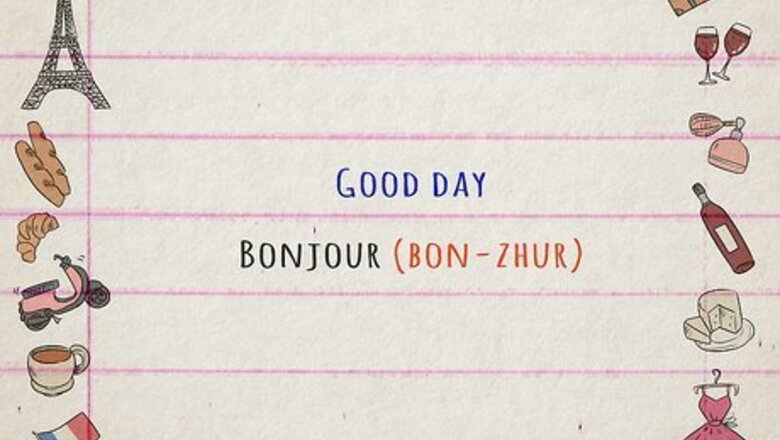
views
Greetings in French
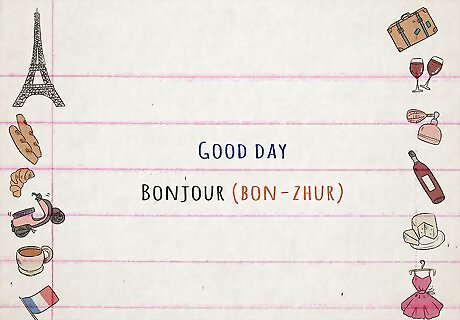
Say hello with "Bonjour." This widely-used greeting means "Good day." It’s a universal greeting that works in any situation, much like "Hello" in English. So, if you’re unsure how to say hello to someone (or just want to memorize a single catch-all term), "Bonjour" is a smart option. "Bonjour" is pronounced, "bohn-zhoor." The "zh" sound is pronounced like the "ge" in "deluge." The “n” is delicate, almost silent. The “r” is also delicate and pronounced with friction (like a gargling sound) in your throat. The “bon” in "Bonjour" means “good,” and “jour” means “day.” Put together into one word, it means “Good day.”
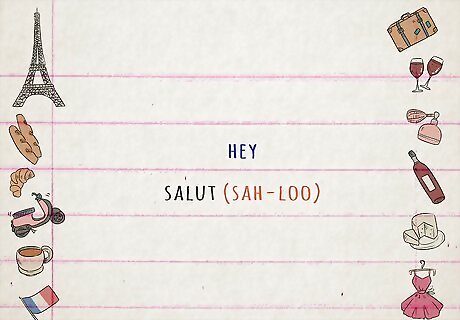
Greet someone casually with "Salut." It’s an informal phrase, just like saying "Hi" or "Hey" in English. Use this pleasantry around friends, family members, and children. However, it’s a good idea to use a more formal greeting for a new boss or professor, as they might think "Salut" is disrespectful. "Salut" is pronounced, “Sah-loo.” The "loo" uses a subtle sound uncommon in English; it sounds like "liu" with a very soft ee sound at the beginning.
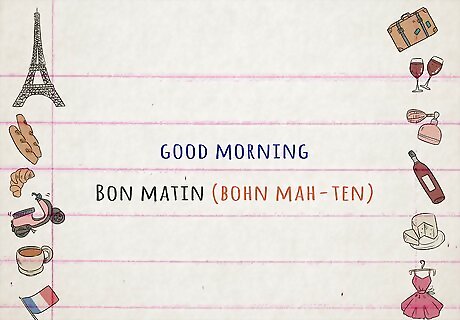
Say hi in the morning with "Bon matin." Use the right salutation for the time of day! "Bon matin" means "good morning." If you’re saying hello to someone in the morning, you can use this greeting in place of "Bonjour" or "Salut." "Bon matin" is pronounced “bohn mah-ten.” “Bon” is pronounced like the beginning of Bonjour, while the “tin” in matin has a soft, subtle “n” sound that is almost silent.
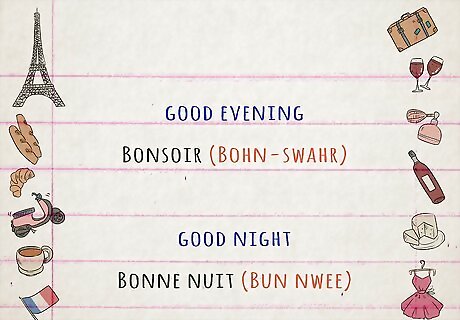
Wish someone a good evening with "Bonsoir" or "Bonne nuit." "Bonsoir" means “good evening,” while "Bonne nuit" means “good night.” Either can be used to say hello in the evening, though "Bonne nuit" is also used as a farewell when you’re saying good night. "Bonsoir" is pronounced “Bohn-swahr.” Like the end of Bonjour, the “r” is soft and pronounced with a gargling sound in your throat. "Bonne nuit" is pronounced, “Bun nwee.” "Bonne" has more of a heavy “u” sound than "Bon."

Greet someone politely with "Enchanté de faire votre connaissance." This phrase lets the other person know how happy you are to meet them. "Enchanté de faire votre connaissance" translates to “Delighted to make your acquaintance,” so only use it when you meet someone for the first time! There are a few alternate ways to say this, too: An informal way to say, “It is a pleasure to make your acquaintance,” is "C’est un plaisir de faire votre reconnaissance" (pronounced, “Set uhn play-zheer duh fayr vot-ruh re-ko-nay-sans”). The formal version of this phrase is "C'est un plaisir de vous rencontrer" (pronounced, “Set uhn play-zheer duh voo ran-con-tray”). It means, “It is a pleasure to meet you.” "Enchanté de faire votre connaissance" is pronounced, “An-shan-tay duh fayr vot-ruh con-nay-sahnse.”
Giving Your Name in French
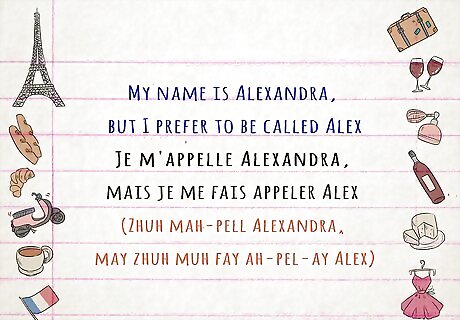
Tell someone your name by saying "Je m’appelle." After the salutation, let the other person know who you are. One of the most common introductory phrases is "Je m’appelle," which translates to, “My name is.” Once you say this phrase, complete the sentence by saying your name. "Je m’appelle" is pronounced, “Zhuh mah-pell.” Again, the "Je" here (or the “zhuh” sound) is pronounced like the "ge" in "deluge." For example, a full introduction could be, “Bonjour! Je m’appelle David.” In that case, you’d be saying, “Good day! My name is David.” Tell someone if you have a preferred name. Say "Je m'appelle Alexandra, mais je me fais appeler Alex" (“Zhuh mah-pell Alexandra, may zhuh muh fay ah-pel-ay Alex.”) It means, “My name is Alexandra, but I prefer to be called Alex.”
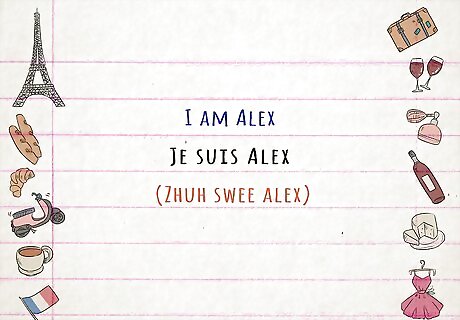
Say "Je suis" to make introductions. "Je suis," translates to “I am” in English. In a full sentence, say "Je suis" and then your name. Both "Je m’appelle" and "Je suis" can be used interchangeably for most situations—the choice comes down to your personal preference. "Je suis" is pronounced, “Zhuh swee.” In a full sentence, you could say, “Bonsoir! Je suis Alex,” to introduce yourself.
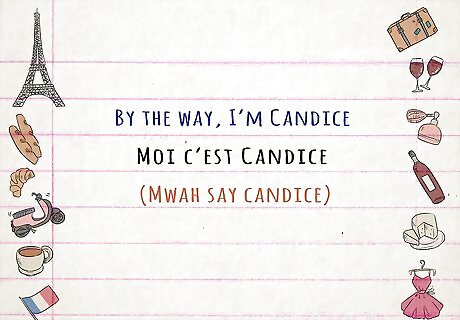
Use "Moi c’est" to mention your name casually. "Moi c’est" means “And I’m,” or “By the way, I’m,” in French. Say this phrase if you chat with someone and realize you haven’t introduced yourself yet. Because the tone of this phrase is so informal, it’s best to use it in relaxed conversations with peers. Finish the phrase by saying your name after "Moi c’est." In a full sentence, you could say, “Moi c’est Candice.” "Moi c’est" is pronounced, “Mwah say.” The phrase "c’est" can sound different depending on the context, which is why it sounds like “say” here, but “set” in C’est un plaisir de vous rencontrer.
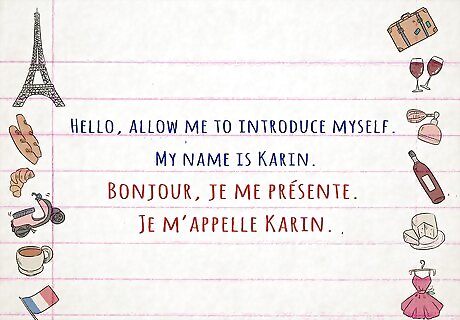
Use "Je me présente" in formal introductions. Use this phrase when you need to be extra polite. It translates to, “Allow me to introduce myself,” and it's ideal for presentations, job interviews, and other professional situations. Once you say the phrase, follow up with "Je m’appelle" and then your name. For example, you could say, “Bonjour, je me présente. Je m’appelle Karin,” which means, “Hello, allow me to introduce myself. My name is Karin.” "Je me présente" is pronounced, “Zhuh muh pray-zant.”
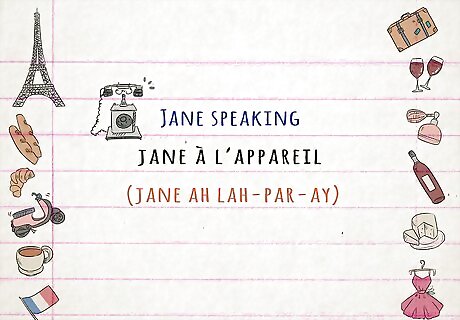
Introduce yourself over the phone with "(Name) à l’appareil." This phrase means “(Name) speaking,” or “(Name) here,” and it’s used exclusively when speaking on the phone in formal business situations when a contact calls you. In most daily phone calls, a standard introduction is fine! "(Name) à l’appareil" is pronounced, “ah lah-par-ay.” Like other words with an “r” sound, this “r” is delicate and pronounced with friction in your throat. When answering the phone in French, you can also begin with the greeting "Allô?" (Ah-low?) It means “Hello,” and it’s only used by French speakers over the phone.
Sharing Information in French
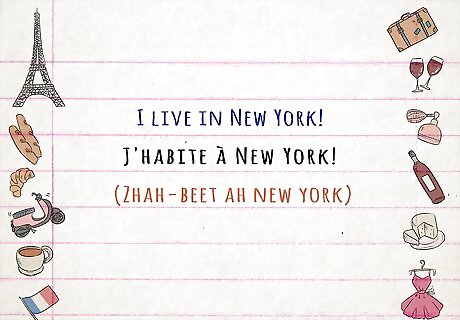
Mention where you’re from with "J'habite à (location)." Since you're not a native French speaker, the person you're talking to will probably be interested to learn about your origins! "J'habite à" translates to “I live in…” so you can share details about your hometown. "J'habite à" is pronounced “Zhah-beet ah.” Finish the phrase by naming your town or even country of origin. For example, "J'habite à New York!" means “I live in New York!”
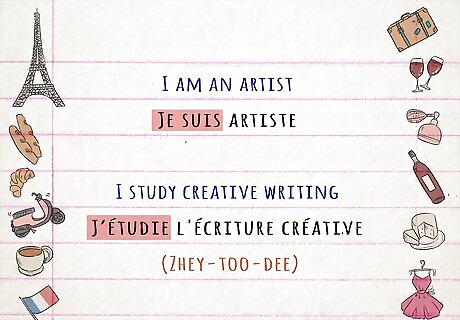
Discuss your profession with "Je suis (job)." If the subject of your job comes up in conversation, use "Je suis," which means “I am,” to say what you do for a living. After "Je suis," say the name of your profession. Try memorizing the name of your profession in French, too, so you can answer this question easily! For example, you could say, "Je suis docteur," which means, “I am a doctor,” or "Je suis artiste," which means, “I am an artist.” If you’re in school (rather than working), talk about your main area of study by saying "J’étudie" (Zhey-too-dee), which means, “I study.” For example, "J’étudie l'écriture créative" means, “I study creative writing.”
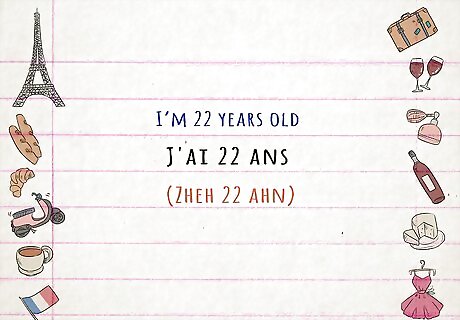
Tell someone your age with "J'ai (number) ans." If appropriate, mention how old you are. This isn't always a topic of conversation that will come up, but if you're a young person meeting older people, it's nice to know this phrase. Use the easy phrase below: "J'ai (number) ans" is pronounced, “Zheh (number) ahn.” The final n is delicate and almost silent.
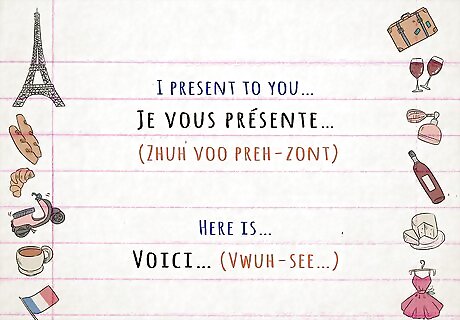
Introduce other people who are with you. Being able to introduce other people is almost as important as being able to introduce yourself. Use the phrases below to make introductions between people you know and people you don't. "Je vous présente…" (Zhuh voo preh-zont) means “I present to you…” Say the other person’s name after this introductory phrase. "Voici…" (Vwuh-see…) means “Here is…” This is a more informal way to introduce someone. Like the first phrase, say the other person’s name after saying Voici.
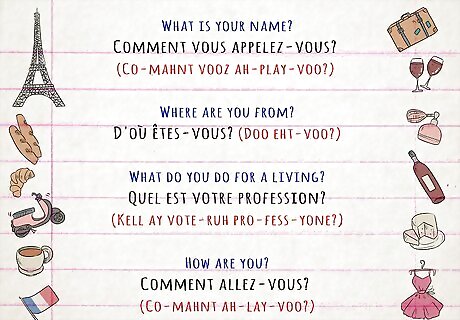
Ask a few basic questions. Once introductions are out of the way, you can have a proper conversation. Prepare a few questions to ask your conversation partner. You don't need to be perfectly fluent to show you're interested in learning more about them! "Comment vous appelez-vous?" (“Co-mahnt vooz ah-play-voo?”) means “What is your name?” "D'où êtes-vous?" (“Doo eht-voo?”) means “Where are you from?” "Quel est votre profession?" (Kell ay vote-ruh pro-fess-yone?) means “What do you do for a living?” "Comment allez-vous?" (Co-mahnt ah-lay-voo?) means “How are you?”




















Comments
0 comment